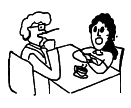 |
 |
 |
(���) ����/���� |
(����) �ڴ�/�ڿ� |
(ģ����)������/������ |
| G2.2 The structure of predicates: the Polite Ending ~���/�ƿ� |
See G2.2 for grammar points.
Predicate endings we have in Lesson 1 and Lesson 2:
Stem |
Ending |
Stem |
Ending |
Stem |
Ending |
| -�� | ���ϴ� (-->�Դϴ�) |
-�� �ƴ� |
���� ���� |
�� | ��� |
| �ݰ� | ���ϴ� | �� | ���� | �� | ��� |
| �ȳ��� | ���� | ���� | ��� | ||
| ��� | ���� | ����� | ��� | ||
| ���� | �� | ���� | ���� | �� | �ƿ� |
| �� | �� | �� | ���� | ���� | �ƿ� |
| �� | ������ | �� | �ƿ� |
<NOTES>
1. -����:
contracted from -��+����
after
a noun ending in a vowel.
Ŀ��:
contracted from ũ+���
2.-���ϴ�/���ϴ� is a deferential ending, the detailed use of which we will learn in later lessons.
The citation ending ~��:
Copular Stem |
Citation
Ending |
Verb Stem |
Citation
Ending |
Adjective Stem |
Citation
Ending |
| -�� | �� | �� | �� | �� | �� |
| �ƴ� | �� | �ȳ��� | �� | �� | �� |
| ��� | �� | ���� | �� | ||
| �� | �� | �� | �� | ||
| ���� | �� | ���� | �� | ||
| �� | �� | �� | �� | ||
| �� | �� | �ݰ� | �� | ||
| �� | �� |
The Polite Ending ~���/�ƿ�:
(i) Stem |
+ �� | (ii) N-�� |
+�� | (iii) Stem |
+�ƿ� | (iv) Stem |
+��� |
| ���� | �� | �� | �� | �� | �ƿ� | �� | ��� |
| �� | �� | �λ��� | �� | ���� | �ƿ� | �� | ��� |
| �� | �ƿ� | �� | ��� | ||||
| �� | �ƿ� | ���� | ��� |
(i) ~��:
if a stem ends in ��,
��,
��,
��
without any final consonant (��ħ),
simply ~ ��
is attached to the stem. More examples:
(ii) N-�ؿ�:
a number of verbs consist of a noun plus �ϴ�,
e.g. �ȳ��ϴ� 'be
well', �λ��ϴ�
'greet', etc.
When ~��� is
attached to the stem ��-,
the combination is contracted to �ؿ�,
that is,
��+��� = �ؿ�
More examples:
The rest of the predicates
are subject to ~���/�ƿ�
variation,
depending on the last vowel
of the stem.
(iii) ~�ƿ�:
if the last vowel of the stem is either ��
or
��
(so-called plus-vowels), ~ �ƿ� is
attached.
Those predicates that end
in ��
are subject to contraction:
���� 'see, look': ��+�ƿ�=����
���� 'come': ��+�ƿ�=�Ϳ�
(iv) ~���:
all the other predicates take ~���.
�Դ� 'eat':�Ծ��,
�ִ�
'exist':
�־��,
�д�
'be
spacious': ��
���ִ�
'be tasteful, delicious': ���־�� ������
'be tasteless':�������
Those predicates that end in a vowel (e.g. �� or ��) are subject to contraction.
���ô� 'drink':����+���=���ſ�
�ִ� 'give': ��+���=���